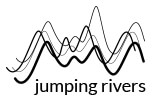Published: April 6, 2020
In our recent post about saving R graphics, it became obvious that achieving consistent graphics across platforms or even saving the “correct” graph on a particular OS was challenging. Getting consistent fonts across platforms often failed, and for the default PNG device under Windows, anti-aliasing was also an issue. The conclusion of the post was to use grDevices::cairo_pdf() for saving PDF graphics or grDevices::png(..., type = "cairo_png") for PNGs or alternatively the new {ragg} package.










